We visited the "15 de febrero" community in May, during one of the trips we made with members of the Community Council of Retalhuleu (CCR) to several of its member communities. We were impressed by the history of this community, so we went back to visit them a month later to learn more.1 It took us an hour to get there, leaving by car from the municipal capital of Champerico. The last half hour of the journey was across an unpaved road. There is no public transport to the community, so if someone wants to visit a neighboring community, they have to pay for transport in a private vehicle.
When we arrived at the community a group of 30 people were waiting for us in a building that used to serve as a school. The building provided shade from the hot sun which reaches 40 degrees Celsius at midday. The meeting began shortly afterwards and the community shared their history, as well as their concerns and worries, with us.
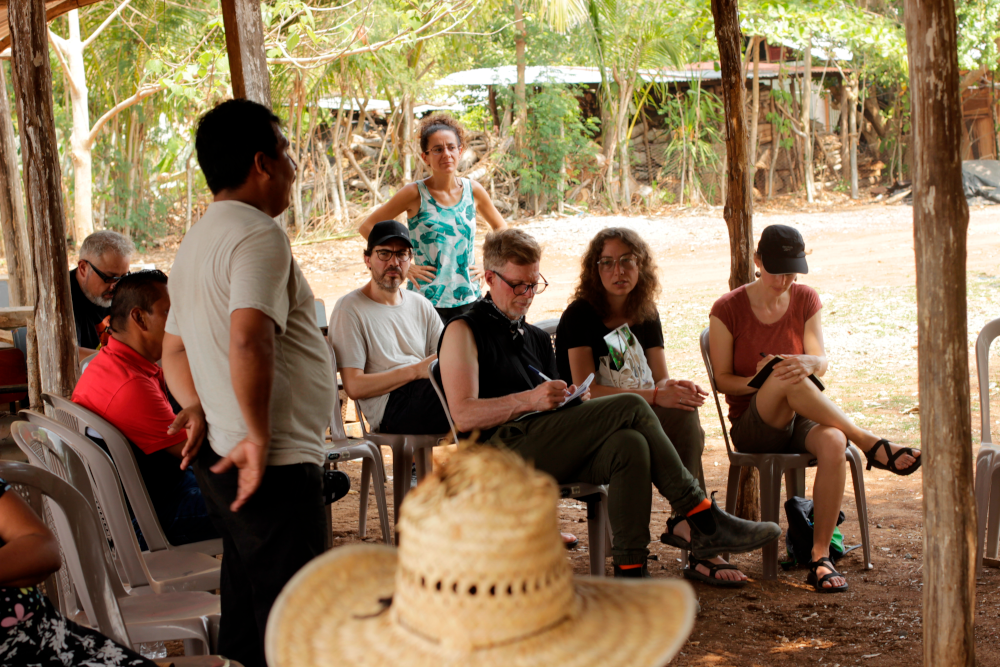
Macario Sánchez told us how the community's struggle for land goes back many years. The families come from different parts of the departments of San Marcos and Huehuetenango. They were brought together by the need for land. Until then they had been renting, but after a while they could no longer afford to pay the rent. They settled in an uninhabited and unused part of a municipal farm, the Montelimar farm, in San Pablo, San Marcos. "We put up our houses and started to work the land." They were evicted, however, in August 2013, after 2 years. 800 riot police from the National Civil Police (PNC) set fire to the firewood the community had collected and burned the entire community. The families were forced to abandon their corn, beans and achiote crops. They lived on the road to La Vega, San Pablo for 8 months, receiving support from an international church such as shelter and hygiene products. At that time the families organized themselves and made contact with the now defunct Secretary of Agrarian Affairs (SAA), who together with the Land Fund (FONTIERRAS), found available land the Buena Vista farm, in La Unión, Tacaná, where they subsequently moved. It was very fertile land for producing bananas, coffee, malanga and papayas and it had enough water. But after three years their luck ran out, because the SAA and FONTIERRAS could not pay the price the owner had demanded for the farm. That's when they were offered land on the South Coast.
In 2017, FONTIERRAS obtained a vacant plot of land and negotiated the conditions of the Q2 million loan (the contribution of the 37 families in the community)2 with the Rural Development Bank (BANRURAL). This was done without the participation of the community nor the Peasant Development Committee (CODECA), who were advising the community at the time. This is the only bank in Guatemala that offers credits to the peasant population; it was created with the mission and vision of being "a financial group oriented towards the integral rural development of the country, (...) directed preferably to micro, small and medium entrepreneurs, farmers and artisans", offering "fair profitability without neglecting social responsibility."
On 15 February 2018, the 37 families moved with their animals and belongings to the 2.5 caballerías of land (1,125,000 square meters), where they held communal title in the name of all the families without knowledge of the conditions of the loan that FONTIERRAS negotiated with BANRURAL. The land now has two water springs, about 3,500 mango trees and the individual work sites that are relatively close by. In the early years an agrarian engineer from FONTIERRA provided technical support to fulfill an economic growth plan aimed at securing an economic and sustainable income for the community. But the residents feel that FONTIERRAS did not take either the conditions of the land nor the climatic conditions that strongly affect productivity into account.
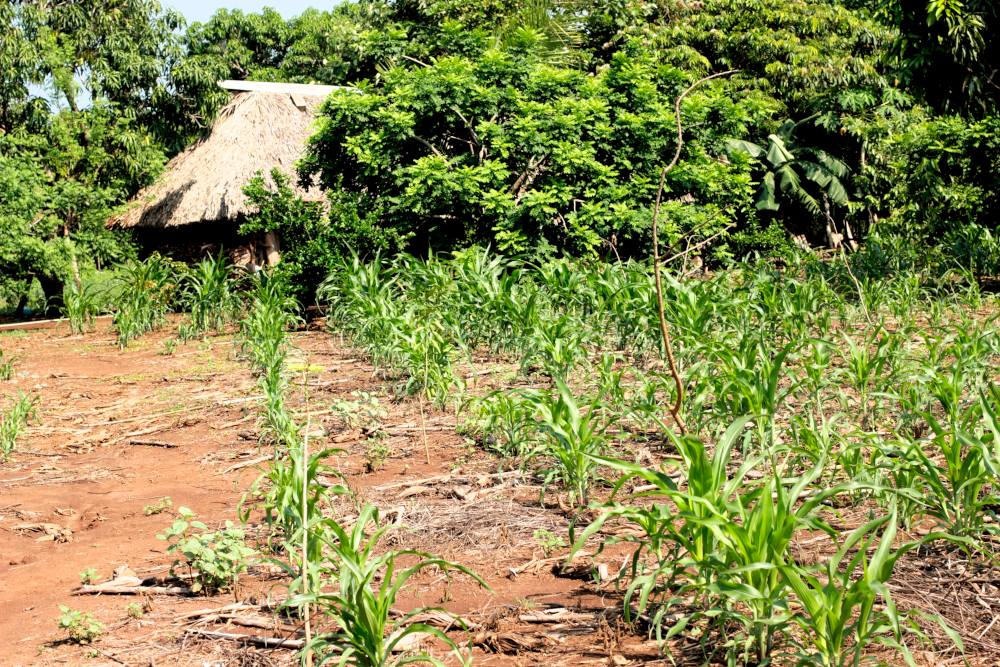
There are plenty of mango trees full of fruit in the community but the corn crops grows unevenly, as the half-developed bushes are interspersed with low bushes which do not reach a height of 30 centimeters. The harvest has not been good over the last five years, and as such there is not much optimism for this year's harvest either: "If it rains a lot, puddles of water form and the plants rot, and if there is no water, the crops die. It’s impossible to understand this land," said Leida Roblero with resignation. Leida has come to the meeting with us to tell us about her struggle to survive on this land that presents multiple challenges, such as the lack of electricity and running water. In addition, the proximity of the El Pilar and Magdalena sugar mills means that water is increasingly scarce and the land polluted. These problems are growing every year and creating a strong sense of uncertainty and vulnerability among the community, who ask themselves: "How much longer can we live here?” They are afraid of being evicted at the end of this year, as they are unable to pay the debt nor the interest on the loan for the purchase of the land, which barely allows them to ensure the survival of their families. Each family has a debt of around Q90,000, to which Q5,000 is added in annual interest per family.
Míriam Yolanda Pérez Chávez points out that aside from corn they have planted sesame, but the prices for this have fallen. "The coyotes3 give us Q300 per quintal, they don't pay us for our efforts. Last year we only harvested 75 pounds of sesame per lot, when we normally harvest 11 quintals per lot; the rest was lost due to excessive rain." The climate in this area is extreme and affects the crops either because of the persistent strong drought or torrential rain. Although mango abound, much of it is wasted, because, in the absence of regular transport, it ripens and rots before it can be sold in the markets. "When it rains, no cars arrive, they can't get into the community because the road is flooded." Mango is the only fruit that has grown abundantly in recent years. Míriam points out that they can sell 100 mangoes for only Q15 or Q20, when in the capital people pay Q10 for 3 mangoes. At that price they can't afford to produce mangoes, getting the production going requires various investments: "Q755 for poison to kill the weeds; Q200 for the cheapest fertilizer; and Q50 to travel to the market." She is proud to say that last year he managed to scrape together Q5,000 to pay the interest to the bank.
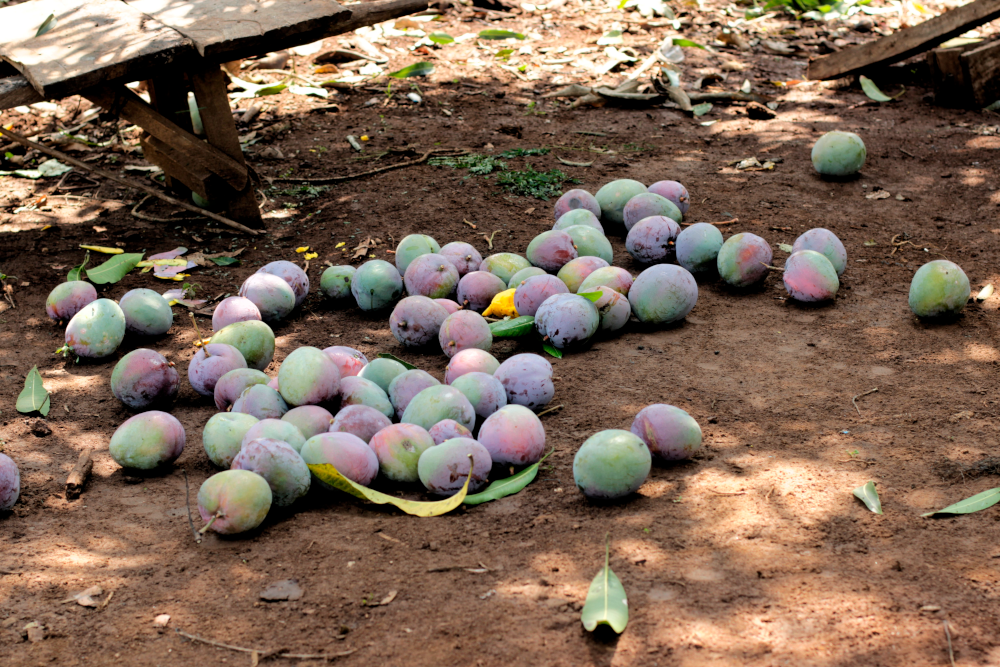
Severino Armando Carreto, the oldest member of the community, says that five years ago they had no choice but to accept this land. However, it turned out to be "dry land". "We came here blindly; at first sight, with the mango trees, we liked it, we never thought it was part of the dry corridor, that the drought would so intense. However, it is summer all year round here, it hardly ever rains. A year after we arrived, some families left because they couldn't stand the heat, but we want to stay here.” He says that in the beginning FONTIERRAS provided them with the services of an engineer who advised them on the development of the community and that they were given communal subsidies during the first few years. "They gave us money to keep and sell pigs, but they ate a lot and we were unable to buy the concentrate we needed to feed them. And we had to give them water from the wells, but to pump the wells we had to buy petrol, which was very expensive. So we did the math and realized we were losing out by raising pigs. Then they gave us a subsidy to raise fish, but to fill the pool with water we had to spend a lot of money again on petrol for the pump and we didn't have enough money, so they died, because they didn't have enough oxygen. None of that worked for us, so we started to sell mangoes, but as there is no public transport, we can't get our produce to market. There is no way that the mayor will pave the road nor provide us with a water tank for the houses or at least for the school toilets or a solar panel to power the water pump. In the five years that have passed, we have been forgotten.”
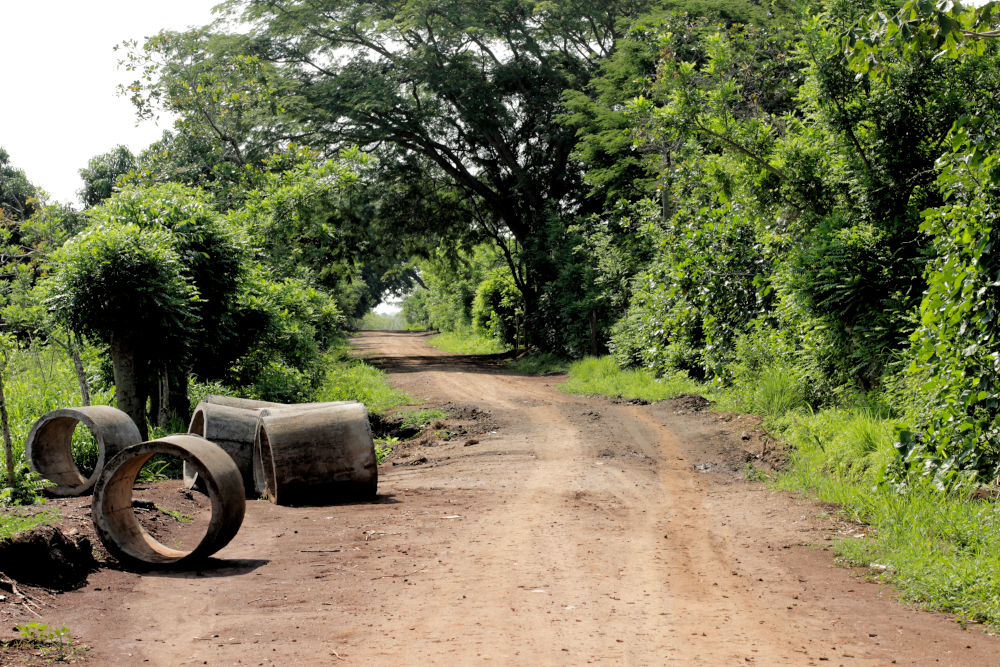
Isabel Sandoval recalls how the land was purchased by FONTIERRAS who made the agreement with the bank, without sharing this information with the community. "FONTIERRAS did not let us know how much we would have to pay per year, because if we had known, we would have reconsidered this deal. The need in our community is great; when FONTIERRAS declared the land for peasant use, they didn't think like peasants. The land was productive, but the projects they provided us with were not suitable. They are harming the poor in this way. FONTIERRAS is supposed to help poor peasants who don't have money to buy a land, but in this case they put us in debt. We don't manage to pay the annual interest. And if we don't pay the debt or the arrears, then the Land Fund is going to evict us, and the bank is going to keep the land."
From 2019 onwards the situation worsened considerably. There was a severe drought that year and the entire corn and sesame crops were lost, but FONTIERRAS did not take this loss into account and the answer they were given was that "you can't fight with the weather." With the onset of the Covid-19 pandemic in 2020 they lost the entire mango crop, valued at around Q150mil (Q1 per mango), because there was no transport to take the mangoes to the markets due to the lockdown declared by the government. In addition, the paddock was set on fire and all the grass was burnt. The community valued the loss at Q900,000, including labour and materials. "We investigated the cause of the fire and we believe it was due to the burning of the sugar cane that took place on neighboring land which jumped to our land, but the businessmen denied it. And because the laws only favor the rich, we could not claim anything.”
Isabel lives with his mother, his wife and their four children. The youngest is two years old and weighs 17 pounds. On one occasion, staff from a health center came to measure the children in the community and diagnosed several children with malnutrition, but that was the end of it, they heard nothing more from any state institution. "The children in this community are suffering from hunger, malnutrition, even acute malnutrition. And why? Because the parents spend what little they have to pay the bank and even then they don't get enough. It's not enough to eat well, we live in extreme poverty. The parents don't have a job, they only dedicate themselves to their land... if the crops were good, maybe they could sell them, but that's not the case. And as the elderly are not able to produce, the debt remains with their children."
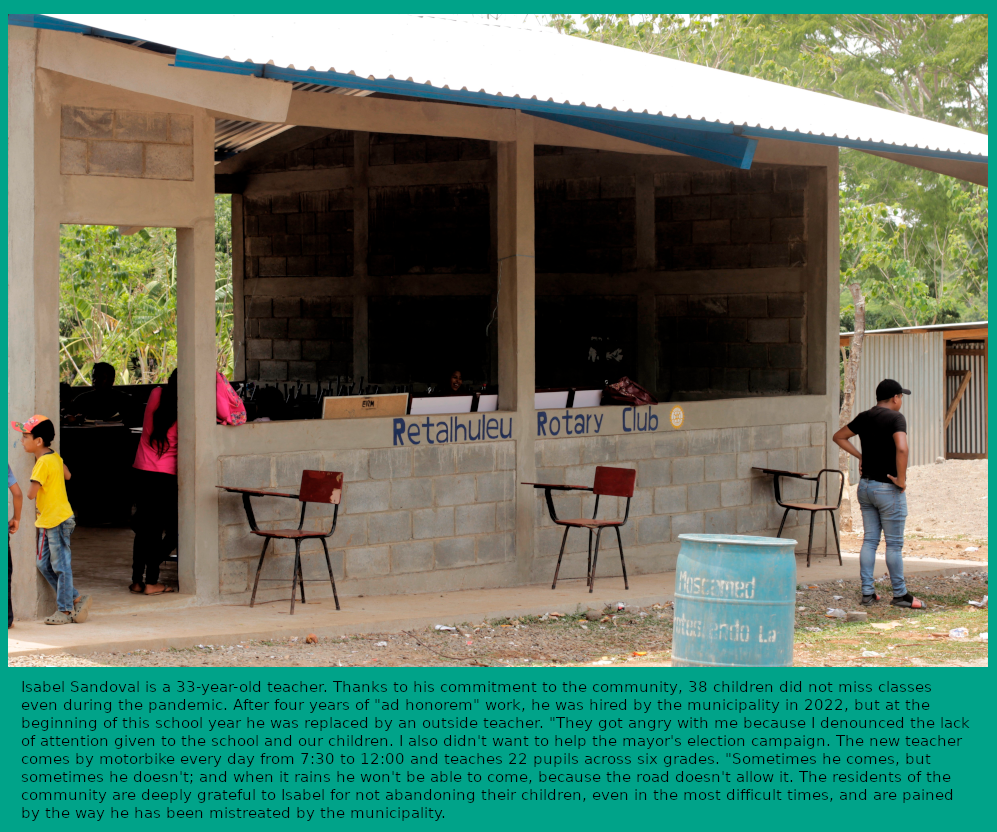
Macario Sánchez can't contain his anger: "FONTIERRAS has forgotten about us. The state never cares about its people. The politicians get rich but they don't think about the people, about them having a dignified life, we are in total abandonment. We live in houses made of tin, plastic and palm. Guatemala is so rich, but its people live in poverty". All the people present at the meeting shared this sentiment. It seems unfair to them that they are subjected to a debt due to the bad negotiation between FONTIERRAS and BANRURAL, in which the community did not participate. The inability to pay has caused them to fear eviction.
Leida Roblero points out that everyone works the land, women, men and children, because it has been abandoned for 15 years and needs a lot of clearing. In addition, the land contains toxins because it was previously used for cotton production and cattle ranching, as well as being surrounded by sugar mills that spray poison on their sugar cane plantations. So the land and water maintain high levels of pollution. "We were given a farm that had been abandoned for 15-20 years, and we worked to make the land arable.”
Regarding access to water, Míriam comments that the community only had one well, but that the water was very dirty, salty and polluted. "An engineer from FONTIERRAS in Mazate came to check the well water once. They confirmed our suspicions, that it was unfit to drink, that it was polluted with bacteria, but they did nothing. We all have health problems here because of the water.” Doña Catalina, the grandmother of four children, says that all of her grandchildren suffer from malnutrition because of drinking the water, "they are always sick in their stomachs." In addition, according to Leida, "initially, the artesian well provided water for all the families, but one well was not enough, so another one was drilled with the help of a church in the USA, but it only works with a pump and electricity is needed. We don't have an elevated water tank to supply water to all the houses in the community. Now we have pump the water, which is at a depth of 16 meters, manually. It’s us women who pump it manually as we need it every day; we fill the water tanks and use it for cooking and washing clothes," even though it is polluted.
The community feels cheated: "At one point they promised to help us get ahead, but the government has forgotten us. After five years the families have accumulated Q2.5 million in debt, more than the initial loan, due to interest. Just to pay the interest alone each family has to raise Q5,000 a year. Saving Q5000 a year means not being able to buy food and farming materials, and no one can get sick. We still live in houses made of nylon, palm and tin, we haven't been able to improve these." Severino claims: "Every year they are bleeding us dry and we have no way out of this debt. If we can't pay off the land, they're going to evict us".
Abelino Mejía, a community leader and member of the CCR, who accompanied us on this visit, has been accompanying land valuation processes for years, seeing if it is suitable for peasant farmers or not, and affirms that this land is totally overvalued. "This land was not suitable for farmers. FONTIERRAS has to evaluate the soil and subsoil before a purchase. This land is not suitable for farm production, but for cattle - that's why the first project was for pigs. It was previously used for cotton production and that is why it is so worn out. FONTIERRAS did not give the necessary support to the community based on the real needs of the families.
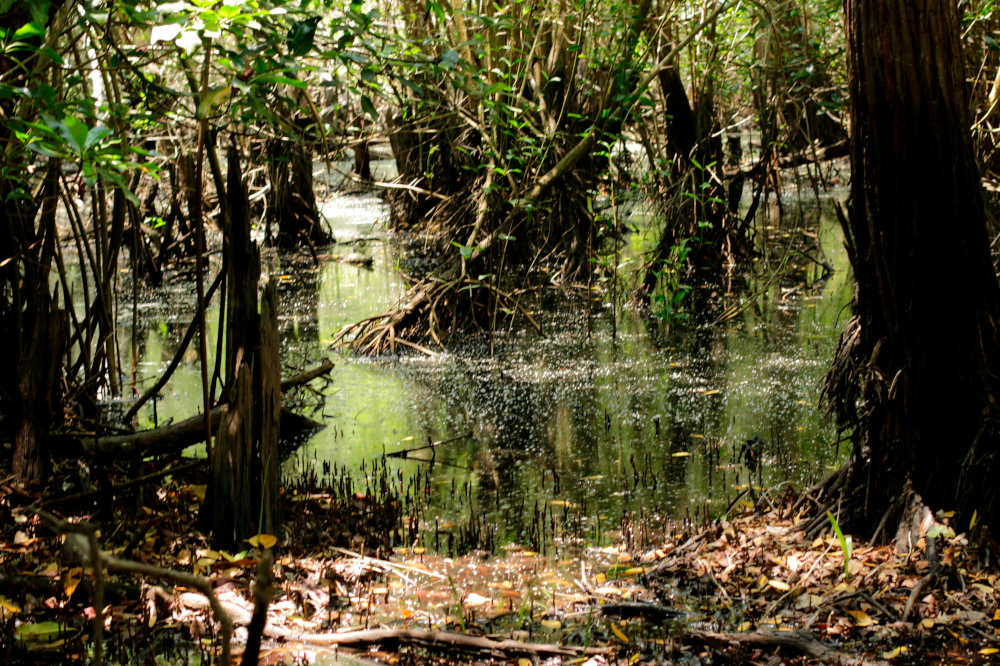
The CCR is supporting the community by creating and maintain family gardens, mangrove cultivation and providing legal advice on how to deal with the threat of eviction. After the meeting, we accompanied a group of residents to the mangroves which, in addition to being a natural space of incalculable ecological value, also have the potential to become a source of income for the community, since, as Abelino explains, the expansion of the mangrove can benefit the community: "If the mangrove is maintained there will be life. Crabs and shrimp can be raised, which can then be sold in the neighboring markets. The mangrove is also a source of water, where there is mangrove, there is water". The CCR also wants to accompany them in the negotiation with FONTIERRA and BANRURAL to reduce the debt payment.
1During these visits, which took place on May 3 and June 15, we gathered the information necessary for this article. All quotations are taken from conversations we had with community members.
2The amount provided by FONTIERRAS was 7 million Quetzales.
3Coyotes are intermediaries between producers/sellers and traders/buyers of agricultural products.

